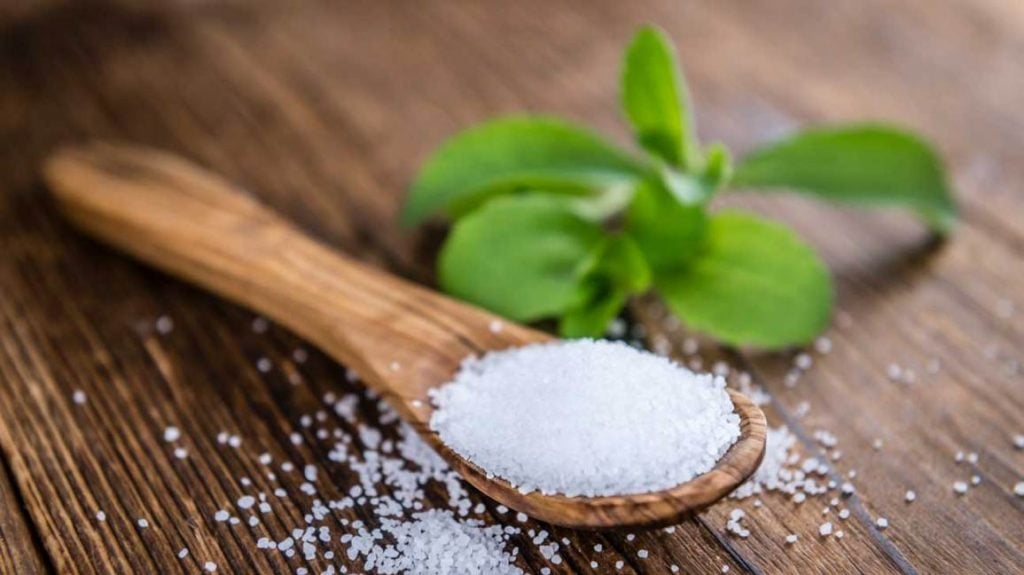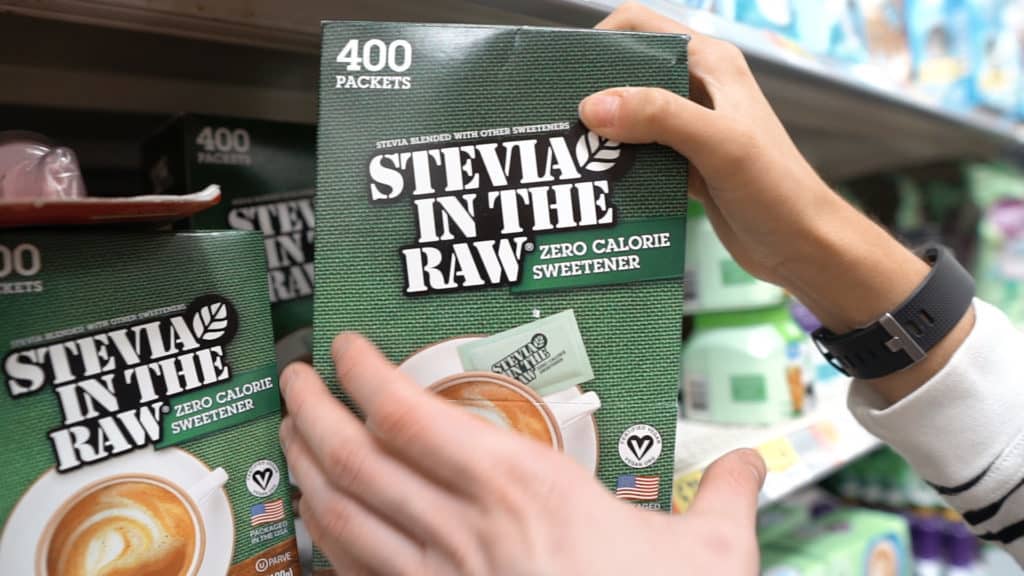Stevia is 200 times sweeter than sugar, which is why it’s such a popular sweetener on keto. You don’t need much, and it does a good job of emulating the taste of table sugar. It doesn’t have that bitter aftertaste that comes with monk fruit.

And although it’s far healthier than aspartame and maltodextrin, many users are reporting stevia side effects.
So does stevia trigger health problems, or is it the artificial sweeteners that companies are adding to stevia that’s causing side effects?
Below, I’ll cover seven side effects of stevia to watch out for while answering some frequently asked questions.
What Is Stevia?
Stevia is a natural sugar substitute that comes from the Stevia rebaudiana plant native to Paraguay and Brazil.
It has zero grams of carbs, so it won’t spike blood sugar levels or inflammation. Stevia also has a zero glycemic index (GI) score, making it a good option for diabetics and pre-diabetics.
Is Stevia Safe?
According to the FDA, stevia leaf extracts are safe to consume. Still, users report side effects like bloating, nausea, low blood sugar and allergies.
There aren’t many studies showing which forms of stevia cause these effects and why they do so.
However, a significant problem with stevia products are the ingredients that companies add to it to cut costs and increase shelf life.
Brands rarely use pure stevia. For example, Stevia in the Raw adds maltodextrin, far worse than regular table sugar. Maltodextrin has a GI of 110, which means it raises blood sugar quickly, promoting cravings and overeating.
In comparison, table sugar only has a GI of 65.
So if you experience side effects after using Stevia in the Raw, there’s a big chance that maltodextrin is causing it, not stevia.
Sweet Leaf is another stevia sweetener that uses an additive called inulin. While inulin is healthier than maltodextrin, it’s known for its bloating effect.
In addition to these add-ons, companies also bleach stevia with chemicals to give it a white color, which contributes to the side effects.
So buy organic green stevia sweetener, as it isn’t bleached and doesn’t contain harmful additives.

1. Gastrointestinal Issues
The most common side effect users experience after consuming stevia is gastrointestinal problems such as diarrhea, bloating and nausea.
This is because of stevia’s stevioside that can irritate your stomach lining. These symptoms can get even worse if you’re using a stevia sweetener combined with inulin like Sweet Leaf.
But remember that this is anecdotal evidence and no study found a concrete link between gastrointestinal issues and stevia.
2. Hypoglycemia
Studies show that stevia can help you lower your blood sugar levels, which is why it’s such a popular sweetener amongst people with diabetes.
However, if you use too much stevia alongside a low-carb diet and diabetic medication, you can run into problems like hypoglycemia. Also known as low blood sugar, hypoglycemia can cause symptoms like:
- Dizziness
- Fatigue
- Sweating
So if you’re experiencing low blood sugar symptoms, we recommend removing stevia from your diet and replacing it with xylitol or erythritol. These sweeteners contain more calories and are higher on the GI scale, balancing your blood sugar.
If your blood sugar remains low, you should consult your doctor, as they’ll be able to adjust your diabetes medication safely.
3. Endocrine Disruption
While there’s little research on this subject, it’s possible that large amounts of stevia can trigger endocrine disruption.
A study conducted in 2016 found that sperm cells exposed to steviol glycosides saw a spike in progesterone production.
However, this study wasn’t done on humans, so we can’t draw meaningful conclusions from it, but it’s something to watch out for.
4. Cause Allergies
Many stevia users in keto forums are complaining about stevia triggering their allergies.
There aren’t studies linking stevia to allergies, but maltodextrin could be the culprit as brands like adding it to purified stevia leaf extract.
Instead, buy stevia in its pure form. It’ll come in a sweet green powder, and contains zero maltodextrin or chemicals. But if your allergies persist, switch to sugar alcohol such as xylitol or erythritol.

5. Stevia May Cause Numbness
Some keto dieters also say that they feel numbness in their feet and hands after using stevia.
While this is only anecdotal evidence, you want to stop using stevia if you feel numbness and consult your doctor.
6. May Lead To Sore Muscles
Research shows that stevioside, the active compound in stevia, can promote muscle sensitivity, especially if you’re lifting weights or taking part in strenuous exercise.
If you started consuming stevia and find you’re taking longer to recover from workouts, cut stevia out of your diet and see if it helps.
7. Low blood pressure
Stevia is an effective treatment for anyone with high blood pressure. However, eating excessive amounts can lower your blood pressure too much.
This increases your chances of hypotension and a range of symptoms like:
- Dizziness
- Lightheadedness
- Blurred vision
If you suffer from low blood pressure or take blood pressure medication, we’d suggest playing it safe and staying away from stevia. Instead, go for a sweetener that has no impact on blood pressure, like erythritol or xylitol.
Who Shouldn’t Use Stevia?
Some people are at an increased risk of developing adverse side effects when consuming stevia. For example, this zero calorie sweetener acts as a diuretic and can lower your blood sugar and pressure, so you can’t take it with certain medications.
You also want to avoid stevia if you fall into one of the following categories:
- You’re taking medications to lower blood pressure
- You have liver or kidney conditions
- You’re taking cancer medications
Although research isn’t conclusive, it’s better to be safe and avoid stevia if you’re in these categories, as it may have side effects when taken with certain medications.

What To Look Out For When Buying Stevia
If you’re shopping for stevia, stick to the green powdered version as manufacturers don’t bleach it with chemicals.
There aren’t studies comparing green stevia powder to the white alternative, but bleaching foods and introducing more chemical processes into the equation usually increases the likelihood of side effects.
You also want to watch out for food additives like:
- Maltodextrin
- Sodium saccharin
- Sodium cyclamate
- Aspartame
Maltodextrin is the sweetener that Stevia in the Raw uses. Research links maltodextrin to an unhealthy gut microbiome and blood sugar spikes. If you experience these symptoms after eating Stevia in the Raw, try a healthier alternative.
You should also avoid crude stevia extracts with sodium saccharin and sodium cyclamate. It’s around 500 times sweeter than sugar and medical papers show it can harm your gut bacteria and increase your risk of testicular damage.
The last ingredient to avoid is aspartame. It won’t kick you out of ketosis, but it could be the culprit behind many “stevia” side effects.
FAQ
Is Stevia Okay To Have Every Day?
According to the World Health Organization, you can have 4 mg of stevia per kilogram of body weight without unwanted side effects. So the average person can eat 10 packets of stevia per day.
Is Stevia Safe To Use During Pregnancy?
Pure stevia is safe to consume during pregnancy because it comes from the Stevia rebaudiana plant and contains zero artificial ingredients.
Multiple studies gave pregnant rats stevia in large doses and it had zero effect on pregnancy or fertility outcomes.
But some brands are starting to add aspartame and maltodextrin to their stevia, so always read the label. These compounds spike blood sugar levels and inflammation and are even linked to Alzheimer’s disease, Parkinsonism, multiple sclerosis and brain tumors.
So if you’re pregnant, only use natural sweetener stevia in its pure, green form.
What Is The Healthiest Sweetener To Use?
The healthiest sweeteners are stevia, xylitol, erythritol and monk fruit sweetener. These are all-natural sweeteners that don’t contain chemicals. Since the carb count is low, you won’t have to worry about it knocking you out of ketosis or spiking blood sugar levels.
Does Stevia Cause Inflammation?
Unlike artificial sweeteners, stevia doesn’t cause inflammation. On the contrary, stevia is anti-inflammatory because it has antioxidants such as flavonoids and diterpene glycosides.
These compounds fight inflammation which is handy if you’re just starting your keto journey and want to counteract the effects of junk food.
Can Stevia Stall Keto Weight Loss?
Stevia contains zero calories, so it won’t stall weight loss on keto. Feel free to use it when making keto coffees, teas or desserts.

Final Thoughts On Stevia Extracts Side Effects
Although stevia is a safe natural sweetener for most individuals, you still want to watch out for side effects like gastrointestinal issues, low blood sugar and allergies. But when looking for a stevia alternative, avoid non-nutritive sweeteners like maltodextrin and aspartame since several studies like it lead to headaches, depression and even cancer.
Instead, opt for xylitol, erythritol and monk fruit sweetener. These sugar substitutes has little negative impact on your body, and can fight inflammation, cavities and weight gain.
Written by
Matt Gaedke
Matt is a former college basketball player turned computer engineer who discovered his passion for health and nutrition after cutting sugar from his diet in 2016. That year he founded KetoConnect with Megha in order to share their ketogenic lifestyle through recipes, videos, and educational content. Matt is always seeking to grow and try new things, a passion he shares with his wife and two amazing sons.

